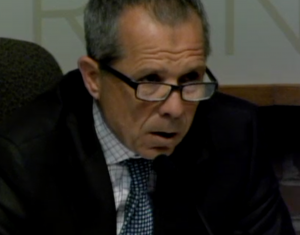Oak Park’s ‘welcoming ordinance’ passed as immigration raids begin
By Jean Lotus Staff Reporter — February 14, 2017
Oak Park Village President Anan Abu-Taleb shared his experiences as an immigrant at the board meeting where the village passed a “Welcoming Ordinance” (Photo courtesy of VOP-TV)
Observers gave a standing ovation to the Oak Park Village Board of Trustees after a 7-0 unanimous vote to approve a “Welcoming Village” ordinance Feb. 6. The ordinance was praised as “the strongest, most progressive and inclusive ordinance in the country,” by immigration activists who said Oak Park would lead the way to “champion policies that provide the most protection without collaboration [with federal immigration authorities.]”
But the new rules may be put to the test soon. On Feb. 10, the Department of Homeland Security announced the end of a two-day “enforcement surge” in Atlanta, New York, Chicago and Texas.
At the village board meeting, Oak Park Mayor Anan Abu-Taleb referred to his own experiences as an immigrant and said he celebrated the day he came to the United States every year.
“I was born and raised in a Muslim home in a Muslim community,” Abu-Taleb said. “I am an immigrant and I am an American.”
“The president’s policies of exclusion and hate are at odds with fundamental American values,” Abu-Taleb added. “No one single man or administration should have the right to destroy our values.”
The beefed up ordinance was a second draft, crafted with the help of immigration lawyers and activists who urged the village to eliminate “loopholes” that would allow village personnel – and police – to collaborate with agents from the federal Immigration and Customs Enforcement (ICE) agency.
Immigration proceedings are part of civil, not criminal law, but immigrants are often turned over to ICE when caught up in the criminal court system, sometimes for serious matters, but often for traffic and other less-serious offenses. ICE sometimes requests local law enforcement authorities to voluntarily detain people with questionable immigration status even if they have not been convicted of a crime.
The board heard emotional testimony from residents, many of whom told their own immigration family histories.
Eduardo Munoz described finding out a child that he was undocumented. “We could not let anyone know. There was a fear of [someone] finding out about our status, and our family being deported or detained,” he said. Munoz said the new ordinance could affect as many as 1,000 families in the village. “I’m undocumented and unafraid,” he said.
Not all the public speakers supported the ordinance. Resident Larry Morris urged the board to put the matter to a citizen referendum. Morris acknowledged that the undocumented immigrants in the U.S. were in a harsh situation. But he said the village should not push back against federal laws.
“America becomes greater when we work with the federal laws of the United States,” Morris said. “Citizenship is more than a piece of paper. It takes allegiance to our flag and our nation to be an American citizen. This is nothing more than mob legislation for street-mob action.”
Trustee Adam Salzman mentioned his own grandfather’s immigration to Toledo, Ohio from the Jewish Ghetto of Vilnius, as a refugee at age 16. “His mother, father and three brothers were murdered,” Salzman said.
The new rules forbid the Oak Park police department or village personnel from collaborating with ICE or informing ICE that a person in custody may be undocumented. If a law enforcement agent receives a request from ICE to assist with rounding up undocumented persons, for example, helping in a traffic dragnet, that officer must report it to a supervisor, who will decline the Oak Park police department’s participation.
No person in custody shall be turned over to ICE custody without a proper criminal warrant, the new code says. ICE personnel cannot use the village’s databases or allow ICE to interview persons in custody.
Oak Park Police Chief Anthony Ambrose said he was comfortable with the village adopting the ordinance. “We will continue with the community policing model that treats all residents with respect,” Ambrose said.
The new rules also do not allow village personnel or agents to ask about immigration status or threaten any person or family members based on actual or perceived citizenship or immigration status. A person who presents ID other than a state ID or drivers license shall not be treated differently or subjected to any additional scrutiny by the village or its agents.
The village will also not participate in any kind of federal registry program based on race, religion or national origin, and the village will not create any such registry, the new law says.
Trustee Salzman said board members had received pro- and con emails and phone calls from residents about the ordinance. He disagreed with the argument that refusing to collaborate with ICE would make the village somehow more unsafe.
“I’m confident nothing could be further from the truth,” Salzman said. “When you drive undocumented immigrants into the shadows, they are less likely to cooperate with law enforcement, and that hinders the ability of our police department to keep our village safe.”
Saltzman also said President Donald Trumps threats to withhold federal funds from “sanctuary cities” was on weak constitutional ground. He said the village would have a strong partner in the City of Chicago to make that legal fight.
On Friday, ICE reported around 160 persons were arrested in Los Angeles, according to a press call from David Marin, ICE field officer. But Marin insisted the arrests were a standard event and not related to any specific directive from the White House. ICE spokespeople did not reveal how many had been taken into custody in Chicago-area raids.
Read the current issue of the Cook County Chronicle
Free subscription to the digital edition of the Cook County Chronicle
— Oak Park’s “welcoming ordinance” passed as immigration raids begin —



